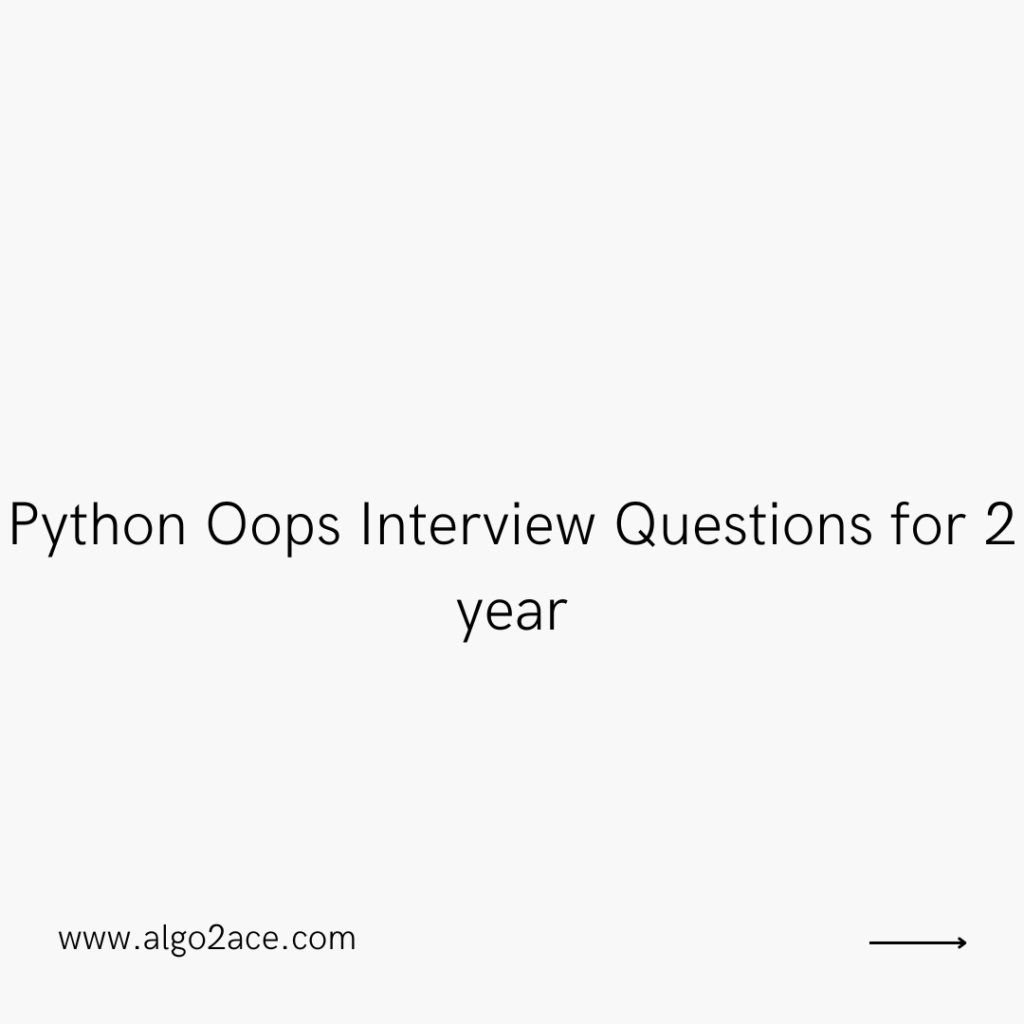Introduction:
In this article, we will explore the most commonly asked Python OOPs Interview Questions for 2 year. Python is a widely-used programming language known for its simplicity, clean syntax, and support for OOP. With its ability to achieve multiple functionalities in fewer lines of code, Python has gained immense popularity and is used in various domains such as ML, AI, web development, and web scraping. The demand for Python developers is soaring, and companies are offering attractive perks and benefits. By mastering Python OOPs concepts and preparing for these interview questions, you can enhance your chances of securing fantastic job opportunities.
In this blogs we have covered asked in the Python Oops Interview Questions for 2 year.
Python Oops Interview Questions for 2 year Experience

Here are some Python OOPs interview questions suitable for candidates with 2 years of experience:
1. What is the difference between a class method and an instance method in Python?
- Class methods are bound to the class itself and can be accessed without creating an instance of the class. They are defined using the
@classmethoddecorator and take the class (cls) as the first parameter. - Instance methods are bound to a specific instance of the class and can only be accessed through an instance. They have the instance (self) as the first parameter.
2. Explain the concept of multiple inheritance in Python.
Multiple inheritance is a feature in Python where a class can inherit properties and methods from multiple base classes. It allows a derived class to inherit attributes and behaviors from multiple parent classes. However, it requires careful handling to avoid conflicts or ambiguities when methods or attributes with the same name exist in multiple base classes.
3. What is the purpose of the super() function in Python?
The super() function is used to invoke the superclass’s methods or attributes from a subclass. It is often used within a subclass’s overridden method to access and extend the behavior of the superclass’s method.
4. How do you achieve method overriding in Python?
Method overriding is achieved by defining a method in the subclass with the same name as a method in the superclass. The method in the subclass will replace the implementation of the method in the superclass when called on an instance of the subclass.
5. What is encapsulation in Python? How is it achieved?
Encapsulation is the concept of bundling data and methods together within a class, hiding the internal details and providing controlled access to the data. In Python, encapsulation is achieved by using access modifiers such as underscores (_ and __) to indicate the visibility of attributes and methods.
6. Explain the difference between shallow copy and deep copy in Python.
Shallow copy creates a new object with a new reference but references the same elements as the original object. Changes made to the original object will be reflected in the copied object.
Deep copy creates a completely independent copy of the object and all its nested objects. Changes made to the original object will not affect the deep copied object.
7. How do you implement abstract classes and methods in Python?
Python does not have a built-in abstract class implementation, but it can be achieved using the abc module. An abstract class is created by inheriting from the ABC class, and abstract methods are defined using the @abstractmethod decorator. Subclasses of the abstract class must implement all the abstract methods.
8. What are class attributes and instance attributes in Python?
Class attributes are attributes that are shared among all instances of a class. They are defined outside of any methods within the class and have the same value for all instances.
Instance attributes are specific to each instance of a class. They are defined within the methods of the class and can have different values for each instance.
Remember to supplement your interview preparation with hands-on coding practice and real-world examples to reinforce your understanding of Python OOPs concepts.
Reference:
Read More Blogs:
Python Scenario Interview Questions example
Conclusion:
Thanks for reading our blog Python Oops Interview Questions for 2 year. here you have covered all the questions which is mostly asked in the interview for python developer.
